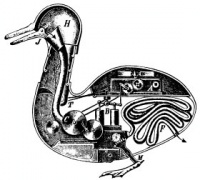Physicalism
From The Art and Popular Culture Encyclopedia

Illustration:The Canard Digérateur, or Digesting Duck, an automaton in the form of duck, created by Jacques de Vaucanson in 1739
|
Related e |
|
Featured: |
In philosophy, physicalism is the ontological thesis that "everything is physical", that there is "nothing over and above" the physical, or that everything supervenes on the physical. Physicalism is a form of ontological monism—a "one substance" view of the nature of reality as opposed to a "two-substance" (dualism) or "many-substance" (pluralism) view. Both the definition of "physical" and the meaning of physicalism have been debated.
Physicalism is closely related to materialism. Physicalism grew out of materialism with the success of the physical sciences in explaining observed phenomena. The terms are often used interchangeably, although they are sometimes distinguished, for example on the basis of physics describing more than just matter (including energy and physical law). Common arguments against physicalism include both the philosophical zombie argument and the multiple observers argument, that the existence of a physical being may imply zero or more distinct conscious entities.

